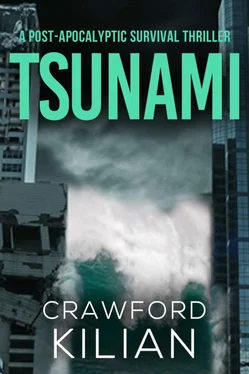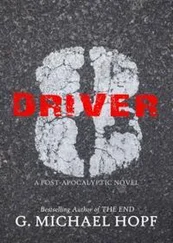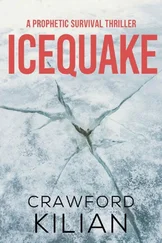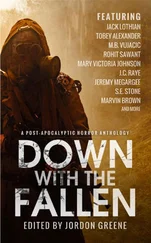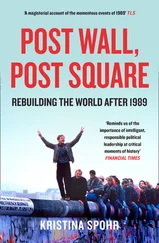“Any experience with guns?”
“Not really.”
“Okay, so we can’t use you as a medical aide or as a guard. Believe me, we need both. How about scrounging?”
Kirstie felt awkward and ignorant. “I’m sorry?”
“Scrounging. There’s a lot of stuff still lying around, okay? You go into stores, warehouses, abandoned houses, wherever, and bring back anything that might be useful. If we don’t get it, the black market guys will. They’re starting to give us some real problems, almost as bad as the feds.”
“That sounds a bit like what my husband’s been doing, down in the wreckage zone, only they call it salvaging.”
“That’s different. In the zone, the stuff has been completely abandoned and usually has to be dug out of the mud and crud. Scroungers stay out of the zone. You usually have a team of three, four, five people, and a pushcart, okay, only really it’s a modified U-Haul trailer. We got a bunch of ‘em.
“And what does it pay?”
“The team splits twenty-five per cent of the haul, okay? If it’s not practical to take home, like a gross of plastic plates and a barometer, we pay in beans and rice, maybe a little flour, but we bargain hard.”
“Well.” She looked at Sam and Einar. “Would you lads like to become fellow scroungers?”
“Sounds all right,” said Sam. Einar nodded.
“Good,” said Bernie. “Now I can tell you that you have to be really careful. The feds say it’s looting and sometimes they shoot scroungers. Some of the black market guys don’t like it either.” He scrawled something on the back of an old memorandum. “Show this to the people in the basement, and they’ll issue you each a gun. You can start work this afternoon.”
* * *
“I can see why they think we need guns,” Kirstie said to Don that night. “Some people didn’t like us at all.” She turned over in bed, groaning; her muscles were sore, and the crude harness, in which she and the men had pulled the trailer, had rubbed her shoulders raw. “Not that we got anything worth fighting for.”
Their total haul, for over four hours’ work, had been three bales of peat moss and a case of motor oil from the shed behind an abandoned house in north Berkeley. Scrounge pay had been a pound of rice for each of them.
“You’re right.” Don lay beside her in the darkness. “More and more people picking over less and less. It can’t go on much longer.”
“It doesn’t make sense,” she complained. “I know about the waves, and I know about the blizzards in the Middle West, and the economic collapse, but even so — this is supposed to be one of the richest countries in the world. Surely we ought to be able to do better than this.”
“Energy,” said Don sleepily. “All the machines are there, but we have to pull trailers with our own muscle. We can’t build anything, we can’t run anything, we can’t grow anything. Not enough energy.”
“If only those bloody oil tanks in Richmond hadn’t burned.”
“Must be more stockpiles.” He was silent for a time, and she thought he had gone to sleep. Then he said: “We were down by Alameda today, by the naval air station. The feds had a big barge sitting just offshore. I think they must have been pumping oil out of storage there. There must be a lot of oil around, out of reach — ah.”
“What is it?”
“Remember that supertanker, the Sitka Carrier ? It went down in Monterey Bay when the tsunamis hit. Half a million tonnes of gasoline and diesel fuel. If you could get down to it, you could rig up a valve and pump the stuff up to a tanker or barge on the surface. Half a million tonnes would last a long time.”
He got out of bed and walked to the window. For a time he looked out, saying nothing. “It’d be a lot of work, but just maybe we could pull it off.”
“Don — I don’t want to spoil your party, but even if you did salvage it, what would we do when the oil and gas ran out? Good God, close to three million people are still living around the Bay Area; they could go through that much in no time. Then we’re back to scrounging again.”
“Not if Dennis Chang gets back in business.”
“And who the hell is Dennis Chang?”
“A guy I know. He’s trying to produce methane on a large scale down in Palo Alto. Hey, Kirstie, how’d you like to go for a cruise?”
“You’ve gone bonkers.”
“You’re not going back to scrounging tomorrow. We’re going down to City Hall to sell the local on a long-term investment.”
“I don’t like your tone of voice. You sound like your grandfather. Now come back to bed; I’m getting cold by myself.”
* * *
When trucks moved at all these days, they moved in heavily armed convoys. Two nights later, eight trailer rigs moved out of Berkeley loaded with clothing, drugs, vitamins, tools and assorted trade goods, bound for the farm communities south and east of San Jose. Don rode in one of the trucks, listening to the driver and his guard exchanging horror stories about hijackers. It seemed slightly unreal to be travelling so fast; in less than half an hour the convoy reached Fremont. Don’s driver stopped; Don got his bicycle out of the rear of the truck. A few seconds later the convoy was gone in a rush of diesel fumes, and he was alone in the darkness.
Visibility was good; the sky was partly cloudy and a full moon hung in the south, bright enough to cast shadows. The air held the now-familiar stink of the shoreline, a mixture of smoke and decay. Seeing water on the road ahead, Don braked and then stopped completely.
The low-lying shore around the approaches to the Dumbarton Bridge was flooded. Water glinted in the gaps between ruined town houses; cars seemed to be floating. The area must have subsided dramatically since the seiches; that had happened in many infilled areas now reclaimed by the bay.
Something about the flooded area bothered him. Dismounting, he walked his bike through water almost knee-deep. As the road rose onto the bridge, he came back onto dry pavement again; turning, he studied the flooded stretch, until he understood what he was seeing.
The seiches had saturated many infills, liquefying them to the point where they could no longer support any weight. Buildings on such sites tilted, collapsed, even sank below the surface. But the town houses near the bridge stood upright, showing only the month-old damage of the seiches themselves. They had not collapsed, because they were not on infill; yet now they stood flooded to a depth of half a metre or more.
The tides, Don knew, had been unusually high lately, and had sometimes reached the freeway along the Berkeley shoreline. He had assumed that was because the waves and seiches had eroded the shore, but now he was not so sure. After all, the Antarctic surge had dumped billions of tonnes of ice into the ocean almost instantaneously; that had triggered the tsunamis. By now, according to his brother’s theory, the ice would have spread far north, while more ice followed it. By July or so, in the dead of the southern winter, the ice would weld together into a floating shelf circling Antarctica. In the meantime, much of it was melting — melting enough to raise sea level by half a metre in a month.
He shook his head in wonder. Half a metre of sea water, distributed all over the world’s oceans, represented an enormous quantity of melted ice. It also meant the loss of much of the Southern Ocean’s stored heat, gone into melting that ice. If all the ice in Antarctica melted, sea level might rise by sixty metres. That seemed highly unlikely, but a rise of ten or twelve metres did not.
A ten-metre rise would drown every seaport in the world and turn many river mouths into brackish estuaries or silt-dogged swamps. The increased area of the oceans would have unpredictable effects on climate; the increased weight of the oceans would strain the earth’s surface.
Читать дальше
